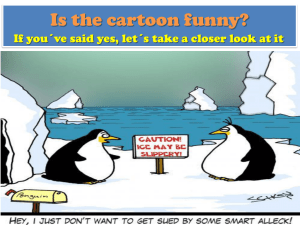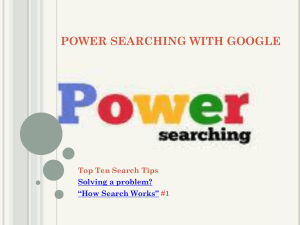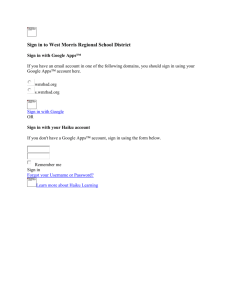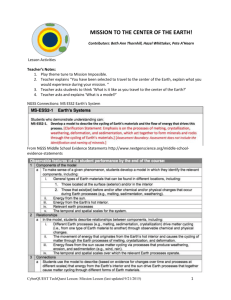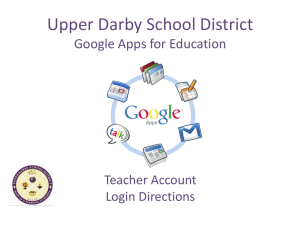UNIT 2 F
advertisement
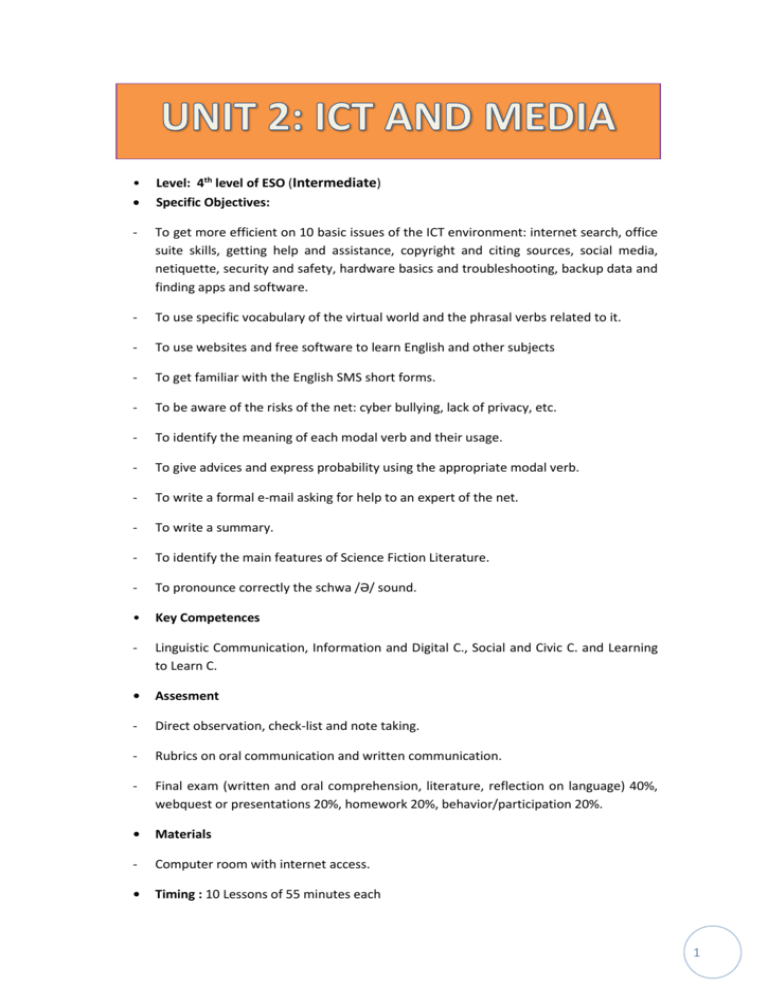
• Level: 4th level of ESO (Intermediate) Specific Objectives: - To get more efficient on 10 basic issues of the ICT environment: internet search, office suite skills, getting help and assistance, copyright and citing sources, social media, netiquette, security and safety, hardware basics and troubleshooting, backup data and finding apps and software. - To use specific vocabulary of the virtual world and the phrasal verbs related to it. - To use websites and free software to learn English and other subjects - To get familiar with the English SMS short forms. - To be aware of the risks of the net: cyber bullying, lack of privacy, etc. - To identify the meaning of each modal verb and their usage. - To give advices and express probability using the appropriate modal verb. - To write a formal e-mail asking for help to an expert of the net. - To write a summary. - To identify the main features of Science Fiction Literature. - To pronounce correctly the schwa /Ə/ sound. • Key Competences - Linguistic Communication, Information and Digital C., Social and Civic C. and Learning to Learn C. • Assesment - Direct observation, check-list and note taking. - Rubrics on oral communication and written communication. - Final exam (written and oral comprehension, literature, reflection on language) 40%, webquest or presentations 20%, homework 20%, behavior/participation 20%. • Materials - Computer room with internet access. • Timing : 10 Lessons of 55 minutes each 1 LESSON PLAN AND ACTIVITIES LESSON 1 Warm Up-Oral Communication 1) Let’s discuss the following questions all together (10’): - What are ICTs? - Which are the ICT that you use? - Which ICT do you use to learn English? Written Communication 2) Fill in the following check list to test your knowledge on basic ICT operations Rate yourself from 1 to 10 (10’). Adapted from: http://educationaltechnologyguy.blogspot.com/2012/01/10-tech- skills-every-student-should.html 3) Take the following quiz on ICT and related vocabulary (10’). http://www.oercommons.org/courses/ict-lca-quiz 2 4) Get in the specific groups that the teacher suggests and listen to the explanation about the project you will have to do on the day before the review (lesson 7) (10’). - You will have to choose one of the following topics to do a presentation: o Social networks and Privacy. o Website for English students or to improve your English skills. o Free software site and a top 10 of most valuable free software applications. o The Copyright and Creative Commons on the net. o Other website that may be interesting to study other subjects. - All the projects must be coordinated through a wiki (http://www.wikispaces.com/) - You will have to do a research on the topic that has been assigned to you. - The outcome of the project will be the list of specific websites you may have visited to get the information, the written version of the oral presentation and the slide presentation. Do not forget to express your opinion in a sensible way. - The oral presentation should be 5 minutes long and each participant will have to speak at least for 45 seconds. - Do not forget to follow the instructions that were given in the previous unit to do oral presentations. 5) You can start organizing the project in the minutes we have left (15’). Homework 6) Watch the following clip about the Information Technology Revolution and write the 3 facts that have impressed you the most. Did You Know Information Technology http://www.youtube.com/watch?v=3vApOQb8A8k&feature=related Revolution: Extra activities (optional) 7) Are you able to guess all the missing words of the crossword? - http://www.esltower.com/VOCABSHEETS/computers/computerparts.pdf 3 LESSON 2 Warm Up-Oral Communication 1) Could you find out the meaning of these SMS expressions (10’)? - CUL8R= ASAP= LOL= 2B@= 2moro= 2nite= B4= - BB= DIY= I wntd 2 go hm ASAP, 2C my M8s again= Here you have some sites that could help you to decode the words and expressions above: - http://www.michellehenry.fr/periodic%20TeXt%20Message%20table001.pdf http://www.netlingo.com/acronyms.php http://www.ego4u.com/en/chill-out/curiosities/sms-english Oral Communication- Written Communication 2) Watch the following video twice and write down a plausible definition for each word ( 10’): Search engines: http://www.youtube.com/watch?v=eSqppic8P4c - Search engine: Spiders: Crawl: Keyword: Metasearch engine: Subject directories: 3) Let’s correct your definitions! (5’) 4) So, what is the difference among the search engine, metasearch engine and subject directories? (5’) 4 5) Get in pairs. You will match some headlines with their corresponding paragraphs but each student will have different parts of the same text. Afterwards, each student will have to tell her or his partner the tips he or she has read to do efficient searches on Google (20’). Adapted from: http://support.google.com/websearch/bin/answer.py?hl=en&answer=134479 STUDENT A a) Use as many terms as possible to specify your search b) Some basic facts c) Select generic words. d) Keep it simple e) Describe what you need with as few terms as possible. f) Think how the page you are looking for will be written. g) Choose descriptive words. h) Definitions Search is simple: just type whatever comes to mind in the search box, hit Enter or click the Search button, and Google will search the web for content that's relevant to your search. If you have Google Instant enabled, results may appear dynamically as you type. Some basic facts • _______________ Generally, all the words you put in the query will be used. • _______________. A search for [ new york times ] is the same as a search for[ New York Times ]. • Generally, punctuation is ignored, 5 •_________________. If you're looking for a particular company, just enter its name, or as much of its name as you can recall. If you're looking for a particular concept, place, or product, start with its name. If you're looking for a pizza restaurant, just enter pizza and the name of your town or your zip code. Most queries do not require advanced opera-tors or unusual syntax. Simple is good. • ________________________. A search engine is not a human, it is a program that matches the words you give to pages on the web. Use the words that are most likely to appear on the page. For example, instead of say-ing [ my head hurts ], say [ headache ],because that's the term a medical page will use. The query[ in what country are bats considered an omen of good luck? ] is very clear to a person, but the document that gives the answer may not have those words. Instead, use the query[ bats are considered good luck in ] or even just [ bats good luck ], because that is probably what the right page will say. • __________________________. The goal of each word in a query is to focus it further. Since all words are used, each additional word limits the re-sults. If you limit too much, you will miss a lot of useful information. The main advantage to starting with fewer keywords is that, if you don't get what you need, the results will likely give you a good indication of what additional words are needed to refine your results on the next search. For example,[ weather cancun ] is a simple way to find the weather and it is likely to give better results than the longer [ weather report for cancun mexico ]. • __________________. The more unique the word is the more likely you are to get relevant results. Words that are not very descriptive, like 'document,' 'website,' 'compa-ny,' or 'info,' are usually not needed. Keep in mind, however, that even if the word has the correct meaning but it is not the one most people use, it may not match the pages you need. For example,[ celebrity ringtones ] is more descriptive and specific than [ celebrity sounds ]. • ____________: To see a definition for a word or phrase, simply type the word "define" then a space and then the word (s) you want defined. To see a list of definitions, from vari-ous online sources, you can type "define:" Followed by a word or phrase. Note That the results will define the Entire phrase. STUDENT B 6 a) Searches with double quotes will find more results. b) Terms you want to exclude c) The OR operator d) * and $ are useful e) Search single word exactly as is f) If you want to add new terms type + or AND g) *Fills the blanks h) Search within a specific website ( site:) • ______________________ ("") By putting double quotes around a set of words, you are telling Google to consider the exact words in that exact order without any change. By insisting on phrase search you might be missing good results accidentally. For example, a search for [ "Alexander Bell" ] (with quotes) will miss the pages that refer to Alexander G. Bell. • _______________________ ("") Google employs synonyms automatically, so that it finds pages that mention, for example, childcare for the query [ child care ] (with a space), or California history for the query [ ca history ]. But sometimes Google helps out a little too much and gives you a synonym when you don't really want it. By putting double quotes around a single word, you are telling Google to match that word precisely as you typed it. • __________________________ (site:) Google allows you to specify that your search results must come from a given website. For example, the query [ iraq site:nytimes.com ] will return pages about Iraq but only from nytimes.com. The simpler queries [ iraq nytimes.com ] or [ iraq New York Times ] will usually be just as good, though they might return results from other sites that mention the New York Times. You can also specify a whole class of sites, for example [ iraq site:.gov ] will return results only from a .gov domain and [ iraq site:.iq ] will return results only from Iraqi sites. • ______________________ (-) Attaching a minus sign immediately before a word indicates that you do not want pages that contain this word to appear in your results. The minus sign should appear immediately before the word and should be preceded with a space. For example, in the query [ anti-virus software ], the minus sign is used as a hyphen and will not be interpreted as an exclusion symbol; whereas the query[ anti-virus -software ] will search for the words 'anti-virus' but exclude references to software. You can exclude as many words as you want by using the - sign in front of all of them, for example [ 7 jaguar -cars -football -os ]. The - sign can be used to exclude more than just words. For example, place a hyphen before the 'site:' operator (without a space) to exclude a specific site from your search results. • ______________________ (*) The *, or wildcard, is a little-known feature that can be very powerful. If you in-clude * within a query, it tells Google to try to treat the star as a placeholder for any unknown term(s) and then find the best matches. For example, the search [ Google * ] will give you results about many of Google's products (go to next page and next page -- we have many products). The query[ Obama voted * on the * bill ] will give you stories about different votes on different bills. Note that the * operator works only on whole words, not parts of words. • _________________________ Google's default behavior is to consider all the words in a search. If you want to specifically alloweither one of several words, you can use the OR operator (note that you have to type 'OR' in ALL CAPS). For example, [ San Francisco Giants 2004 OR 2005 ] will give you results about either one of these years, whereas [ San Francisco Giants 2004 2005 ] (without the OR) will show pages that include both years on the same page. The symbol | can be substituted for OR. (The AND operator, by the way, is the default, so it is not needed.) 6) Which commands should we use to make our search as efficient as possible? ( 5’): - Definition of webinar: - I want to find the fastest way to go from Basauri to Bilbao at 22.00 on Friday (by bus, subway, train). - I don’t remember the way that is spelled “jirafa” in English and I need to find information about it. - I want to check the results for marsupial species except kangaroos. - I ‘m not sure about the following expression is get in/into trouble, check it on an English speaking website. Homework 7) Find the answer to these questions in as less clicks as possible: - http://www.learnwebskills.com/search/hunt.html Extra activities (optional) 8) Read the following advices and write down the most useful ones: - http://www.learnwebskills.com/search/main.html 8 LESSON 3 Warm Up-Oral Communication 1) Imagine that your mouse is broken or that your right hand is too strained how you would do these actions with a keyboard? (10’): Program Word, Open Office* Mozilla Firefox Any Any Any Any Any Any Any Any Action English Spanish Search Search Cut Copy Paste Forward Back Save ñ Ñ *Notice that Open Office always uses English commands. Adapted from: http://en.wikipedia.org/wiki/Table_of_keyboard_shortcuts Reflection on the language 2) Follow the explanation while you look at the chart of the link below ( 20’) - http://www.englisch-hilfen.de/en/grammar/hilfsverben2.htm 3) Do the exercises according to the level that the teacher has assigned you. If you were assigned the A level you will do the exercises corresponding to this level and the first three exercises that correspond to the B level. If you were assigned the B level you will do all the exercises on the B level. If your level is C you will start with the exercises 4, 5 and 6 from the B level and do the exercises of the C level as well (25’). LEVEL A ( Easy) LEVEL B ( Medium) LEVEL C ( Difficult) Exercise 1; Exercise 2;Exercise 3 Exercise 1; Exercise 2; Exercise 3; Exercise 4; Exercised 5; Exercise 6 Exercise 1; Exercise 2; Exercise 3 Homework-Written Communication 4) Using the modal verbs you will have to explain to an expert a technical problem you had with your computer (bug, software or hardware problem etc.) by e-mail (Minimum 125 words). 9 Extra activities (optional) 1) You can find more grammar exercises and explanations on the following websites: - http://www.agendaweb.org/ - http://www.englishpage.com/ - http://www.ego4u.com/ - http://www.englisch-hilfen.de/en/ LESSON 4 Warm Up-Oral Communication 1) Look at the headlines and decide which of them are true and which of them are false. Remember to use modal verbs to express your predictions! (10’) • Israel attacks Iran with computer Virus • Smartphones and social networking sites are likely to become the next big target for cyber criminals, according to a security industry report. • New DroidDream malware infects 24 Android apps: DroidDreamLight Trojan has affected between 30,000 and 120,000 customers • In a continuation of the previous week's attack on the European Commission and the European External Action Service, highly skilled hackers penetrated the network of the European Parliament in Strasbourg, France. • I slit my wrists because I was cyber-bullied (14 years old) • Ms. Brenda Parke, a 60 year old retiree, was scammed out of £60,000 during February and March this year after joining an online dating site and befriending a man calling himself Bradford Cole. • A postman from Cornwall who used social-networking websites to abuse hundreds of children has been jailed for eight-and-a-half years. 2) If you were an expert, what advices would have you given to these people or companies (10’)? - E.g: “ Children should not enter social nets without their parents control.” 3) Watch the following video clip and order chronologically the events that take place Some events might not fit on the story (10’): - Childnet International- Cyber Bullying: http://www.youtube.com/watch?v=fNumIY9D7uY The boy is blackmailed. 10 The mother realizes that his son is in trouble. They sent a victim an address of a web site where he is ridiculed. The teaching staff becomes aware of everything when the boy decides to tell the story on a video. At the end all the bus laughs at him. The victim receives various SMS insulting him. The bullies take pictures of him without permission. The bullies openly recognize that they are cyber bullying the boy. Police comes to school to arrest the bullies. Everyone in the class agreed from the beginning that he should be bullied TIP: When you do an exercise like this one try to highlight or underline the word that can allow you going through all the sentences faster while the video is being played. 4) Give a synonym for the following expressions, you can check a dictionary if needed (10’): - I can’t take it anymore: Left it off: Go on and on: School didn’t take notice: You little kissass!: 5) Answer the questions using modal verbs (10’) - What would you have done if you were him? - Imagine that you were a friend of his, which is the advice that you would give him? - Do you think that his teachers and his mum acted correctly? - Do you think that he solved the problem correctly? - What are the measures that must be taken to avoid these cases? - Who do you think that police should talk to? Who has to be blamed for the entire situation? - How will you react if you get to know that one student is being bullied? 6) Let’s discuss the questions aloud (5’) 11 Homework- Written Communication 7) Answer the e-mail of one of your colleagues, giving advices about how to fix his or her problem. Extra activities (optional) 8) Analyze the press and find out another case were the inappropriate use of ICTs lead to a crime. How can society avoid these problems? - http://www.bbc.co.uk/ - http://www.guardian.co.uk/ - http://global.nytimes.com/?iht LESSON 5 Warm up- Written Communication/ Oral Communication 1) Red aloud the solution you gave to your colleague (15’). Oral Communication 2) The schwa is one of the most frequent sounds of the English language. Let’s watch the video and listen how it should be pronounced ( 15’) - http://www.bbc.co.uk/worldservice/learningenglish/grammar/pron/sounds/vowel _short_5.shtml 3) Read the theory of the link below and try to do the exercise that appears on the bottom of the text (15’) - http://www.bbc.co.uk/worldservice/learningenglish/grammar/pron/features/sch wa/ Reflection on the Language 4) Match the phrasal verb with its corresponding definition and make a sentence with each of them (10’). PHRASAL VERBS DEFINITION work out filter out Performe a procedure go through (a Print information stored in a computer Think about a problem and find the answer 12 procedure) print out cut out (of an engine set up wire up back up Suddenly stop working Get rid of something unwanted (eg noise, an impurity) To make a copy of a computer program Place equipment somewhere and get it ready Connect (a plug) with electrical Homework 5) Record yourself pronouncing the following sentences, pay attention to the pronunciation of the schwa. Check your dictionary to get all the schwas done. 1. It’s five to two and we're late. 2. A table for four, please, around seven if possible. 3. She can type 60 words per minute. 4. George will cut them into smaller pieces if you ask him. 5. Pass the spoons and forks, please. 6. I'm going to appeal this decision, you know. 7. The President said that that was his policy. 8. You could've informed me about it. 9. Do you have to work late this evening? 10. Good-bye, see you later Source: http://international.ouc.bc.ca/pronunciation/eslp025unit09.pdf Extra activities (optional) 6) Take a verse of a song you like and try to underline in its lyrics all the schwas while you listen to it. LESSON 6 Warm Up- Oral Comprehension 1) We will play the taboo game with words that are related to science fiction (10’). 13 Words that have to be guessed UFO Robot Invader Alien Words you can’t use Spaceship- Martian-Flying Mechanic-Artificial-Human Invasion-Space-Conquer Planet-Green-Outsider Literary Education 1) Let’s analyze the main features of Science Fiction as a literary genre (15’). - Science Fiction: I can identify features of the Science Fiction genre: http://www.primaryresources.co.uk/english/englishC6.htm#science 2) You will get an extract of a Science Fiction novel and you will have to convince your partner to read it. Do not forget to mention the author and the title (15’) NOVEL AUTHOR The Time Machine I Robot 2001: A Space Odissey The Hitchhiker's Guide To The Galaxy Movie Trailer Ender’s Game Dune EXTRACT H.G Wells Isaac Asimov Arthur C. Clarke http://www.online-literature.com/wellshg/timemachine/ http://en.wikipedia.org/wiki/I,_Robot http://en.wikipedia.org/wiki/2001:_A_Space_Odyssey_(novel) Douglas Adams http://en.wikipedia.org/wiki/The_Hitchhiker%27s_Guide_to_the_Galaxy Orsson Scott Card Frank Herbert http://en.wikipedia.org/wiki/Dune_(novel) http://en.wikipedia.org/wiki/Dune_novel 3) Let’s watch the video clips of the following films that were based on some of the books we saw (15’). - The Time Machine (2002): http://www.youtube.com/watch?v=8PgykNKcI7A&feature=related I Robot: http://www.youtube.com/watch?v=s0f3JeDVeEo 2001: A Space Odissey: http://www.youtube.com/watch?v=N6ywMnbef6Y Hitchhiker's Guide to The Galaxy : http://www.youtube.com/watch?v=MbGNcoB2Y4I Ender’s game: http://www.youtube.com/watch?v=JzuW9j7fXgk Dune: http://www.youtube.com/watch?v=XfKC1Poe6Gk Homework- Written Communication 4) Write a Science Fiction short story and hand it to the teacher the day before the exam (Lesson 8). Extra activities (optional) 5) Get one of the titles above and enjoy reading it! 14 LESSON 7 Oral Communication 1) We will listen to the presentations about ICTs. You will have to assess the presentation of your peers noticing the aspects you think they were good at and their weak points. ( 40’) Written Communication 2) We will read aloud the following text, sentence by sentence. While we read, try to concentrate on the pronunciation of the schwa sound. Source: http://www.writeanygenre.com/how-to-write-a-summary.html Tips for How to Write a Summary 1 – Read the entire document through. This will give you a more complete understanding of its meaning. While reading, on a separate piece of paper, make a notation of the subject being written about. Notice that the subject should be spoken of at least in the beginning and the ending of the piece. Having read through once, ask yourself: How does the story begin? How does the middle support and move the idea along? How does the ending fit? 2 – Assuming you have a working copy of the document, and not the original, go back through and highlight all points crucial to the theme or to the subject of the writing. 3 - When you have finished the above steps, look only at your notes, and write a one or two-sentence statement that explains what the story is about. 4 – Next, list the main points you’ve highlighted in order to show the flow of the plot or article topic and purpose. 5 – Now write what you believe the story or article is about. Use only the main points that you have highlighted. Write in your own voice or terminology. Do not write what is already in the material. 6 – The last step in how to write a summary is writing the conclusion. State what you feel was the purpose of the story or article, or what the author accomplished in the writing. Do not inject any of your own thoughts. 15 7 – As with anything written, once your summary is finished, proofread and edit. Be certain that any strange spelling and terminology used by the original author of the piece are included in your summary. TIP: “Writing summaries is a good way of concentrating in the most relevant ideas and studying for an exam” Homework 3) Try to write a summary of the present issue to study for the English Exam. Here you have some key points that you should include in your summary: - What are ICTs? - How should you do an efficient search on google? - What is cyberbullying? What can you do to avoid these situations? - Modal verbs: structure, usage and keywords. - Phrasal verbs on technology. - Science Fiction: features LESSON 8: REVIEW 1) We will paste paragraphs from your summaries on a google doc file to do a refunded version of all the summaries. We will read it aloud and add or erase some sentences of needed so that all of you can have a perfect summary for the exam (30’) Reflection on the Language 2) Go to the following link and do the quizzes on modal verbs ( 15’) http://www.esl-classroom.com/grammar/gindex.html 3) Do you have any doubts about the exam? ( 10’) LESSON 9: EXAM 16 LESSON 10 1) We will correct the exam that you’ve done the previous lesson ( 20’) 2) The teacher will give you a file with the most common errors that he or she noticed in your writings. You must have a look and correct them ( 20’) 3) We will do the assessment of the unit playing the music box. You will be seated in a circle and you will pass a box with some questions from one to another. When the music stops the person that has the box in her or his hands must pick up a question from the box and answer it (15’). ANNEXES - Assessment materials: Adapted from: - http://www.slideshare.net/josezubia/observation-checklist http://rubistar.4teachers.org/ www.teach-nology.com 17 18 19 20 21 22 23 24 BIBLIOGRAPHY The present didactic unit has been mainly conceived with OER materials. In most of the cases students are addressed to the original website of the exercises. When an exercise has been adapted or copied the original source is explicitly mentioned on the exercises so that the author is always recognized as the creator of the materials. 25
